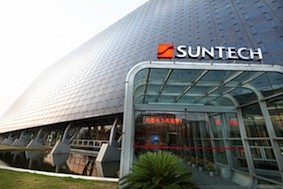
Operating leverage and financial leverage is a No No
Shi Zhengrong received his Doctorate from the University of New South Wales’ School of Photovoltaic and Renewable Energy Engineering in 1992 under Professor Martin Green, the “father of photovoltaics”.
After working for Pacific Solar, a university spinoff, Dr Shi returned to China in 2001 to start the solar power company, Suntech.
Suntech Power Holdings Limited listed on the New York Stock Exchange and over the two years to late 2007 its share price climbed from $15 to above $88.
Dr Shi was a “solar billionaire”, well regarded on the public speaking circuit and had set his sights on Suntech becoming as big as BP or Shell.
Suntech quadrupled its capacity to 2,400 megawatts over the four years to 2011 making it the world’s largest solar manufacturer at the time.
Four of the six top global panel manufacturers are based in China while Sharp from Japan and Q-Cells from Germany make up the balance.
As the global photovoltaic capacity went into over-supply, we have seen the solar cell prices decline by 75% from $1.50 to $0.38 per watt since October 2010.
Despite raising $0.74b from Wall Street in two stock offerings in 2005 and 2009, Suntech has debt of US$2billion and $0.54b of bonds which matured (and are now in default) on 15 March 2013.
Suntech lost $1.0b in 2011 and the consensus forecast loss for 2012 was $0.46b.
Their share price has declined to $0.59 (down 99.4% from its peak), valuing the Company at $79.6m and a bankruptcy petition has just been filed. The Company is now in a trading halt.
Given the parent company is incorporated in the Cayman Islands, the US bondholders are likely to come off second best to the Chinese Bank lenders since the Company’s assets are within the Wuxi Suntech Power Holdings Limited subsidiary.
These processing assets are based in Wuxi, about 135 kilometres west of Shanghai.
Motto: Beware of Companies that have both enormous operating leverage and financial leverage.
Roger, would you relax your caution on leverage if a firm could limit the bargaining power of customers and was not dependent on market prices? Usually a firm in this position may not need leverage (Apple). If a project presents itself that offers excess returns and the firm does not have cash available, would it not be acceptable to finance this via debt and receive the tax shields adding to firm value? Management better have very good forecasting of revenues tho.
Firm value can quickly deteriorate and inhibit equity value if Revenue, EBIT or volume sales turn. Humans tend to believe the recent past is a good approximation for the indefinite future and fail to predict accurately or identify turning points. If a firm could limit the bargaining power of customers and was not dependent on market prices it would be a very valuable company and likely to raise the ire of its customers and then government…I am sure you can think of some examples currently in the press today?
A very interesting story and warning. Especially considering the various warnings about iron ore prices on this blog.
I can think of a few companies that fit the high operating and financial leverage category.
I recently purchased a 1.5KW solar system, and frankly I do not know how a company making these popular panels with the potential of increased worldwide sales could default. So what did they use the debt facilities for? Its sad Roger but I think of those who invested and lost. My panels came from another source however Suntech was one panel I did look at. But in the end I took my installers advice perhaps he knew more than I did!